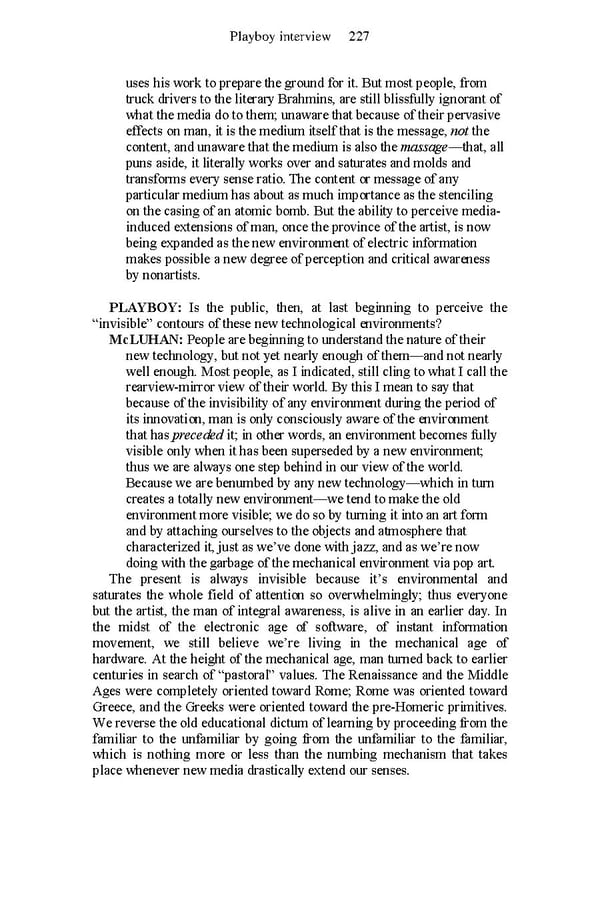Playboy interview 227 uses his work to prepare the ground for it. But most people, from truck drivers to the literary Brahmins, are still blissfully ignorant of what the media do to them; unaware that because of their pervasive effects on man, it is the medium itself that is the message, not the content, and unaware that the medium is also the massage—that, all puns aside, it literally works over and saturates and molds and transforms every sense ratio. The content or message of any particular medium has about as much importance as the stenciling on the casing of an atomic bomb. But the ability to perceive media- induced extensions of man, once the province of the artist, is now being expanded as the new environment of electric information makes possible a new degree of perception and critical awareness by nonartists. PLAYBOY: Is the public, then, at last beginning to perceive the “invisible” contours of these new technological environments? McLUHAN: People are beginning to understand the nature of their new technology, but not yet nearly enough of them—and not nearly well enough. Most people, as I indicated, still cling to what I call the rearview-mirror view of their world. By this I mean to say that because of the invisibility of any environment during the period of its innovation, man is only consciously aware of the environment that has preceded it; in other words, an environment becomes fully visible only when it has been superseded by a new environment; thus we are always one step behind in our view of the world. Because we are benumbed by any new technology—which in turn creates a totally new environment—we tend to make the old environment more visible; we do so by turning it into an art form and by attaching ourselves to the objects and atmosphere that characterized it, just as we’ve done with jazz, and as we’re now doing with the garbage of the mechanical environment via pop art. The present is always invisible because it’s environmental and saturates the whole field of attention so overwhelmingly; thus everyone but the artist, the man of integral awareness, is alive in an earlier day. In the midst of the electronic age of software, of instant information movement, we still believe we’re living in the mechanical age of hardware. At the height of the mechanical age, man turned back to earlier centuries in search of “pastoral” values. The Renaissance and the Middle Ages were completely oriented toward Rome; Rome was oriented toward Greece, and the Greeks were oriented toward the pre-Homeric primitives. We reverse the old educational dictum of learning by proceeding from the familiar to the unfamiliar by going from the unfamiliar to the familiar, which is nothing more or less than the numbing mechanism that takes place whenever new media drastically extend our senses.
 Essential McLuhan Page 233 Page 235
Essential McLuhan Page 233 Page 235